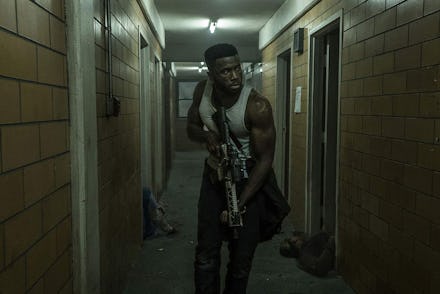How ‘The First Purge’ spins deranged fantasy from real-world tragedy

The ongoing series of Purge films prides itself on being the horror franchise in closest proximity to reality. It starts with the eerie plausibility of the premise — what if, for one night each year, all crime was legal? Regular people and the laws they’re willing to obey make for a far more disturbing source of terror than some machete-wielding goalie or pizza-faced dream-demon.
2016’s The Purge: Election Year got rather cute about America’s slow slide into the exact sort of fractious chaos the earlier installments had envisioned, dropping lines about making America “great again” as if to cue up the obvious jokes about the future of Trump’s domestic policy. The decision from Universal to unofficially set up shop on July Fourth weekend — the new prequel, The First Purge, is the second consecutive installment to be released around Independence Day — underscores that these films offer conspicuous commentary on national themes.
If the preceding three Purge films have nodded toward real life, the latest grabs it by the — oh, you know the quote. The script from James DeMonaco invokes the sitting president’s most infamous soundbite for a minute-long scare involving a rapist hiding in a manhole: Lying in wait, the creep attempts to roughly manhandle one of the protagonists, only to get pepper-sprayed in the face and dismissed with the epithet, “You pussy-grabbing motherfucker!” The moment angles for chuckles of recognition and cheers of cathartic release, and was met with a smattering of such responses in this critic’s advance screening. Yet I found it rather difficult to work up the enthusiasm, having just witnessed a woman narrowly avoid sexual assault, and having been reminded of the horrors ongoing beyond the auditorium’s walls.
The First Purge does this kind of thing a lot, goosing its set pieces with shock or pathos built up in the real world, and then accessed through clear allusion onscreen. A massacre of innocents taking refuge in a church during Purge Night calls to mind the Charlestown shooting; a scene totaling no more than 15 seconds shows a gang of policemen circling a defenseless black man on a baseball diamond, a possible reference to countless atrocities; a convoy of Ku Klux Klan-styled marauders rove the streets in search of innocent souls to lynch; one particularly driven baddie wears a latex Schutzstaffel getup, and his campaign of slaughter through a densely populated apartment complex in Staten Island is shot just like the Kristallnacht sequence in Schindler’s List.
The basic premise of this origin story — that the government offered citizens the chance to kill each other, and then sent in hit squads to stir the pot when nobody seemed all that interested in murder — uses state-sponsored extermination as its starting point. Before the word “purge” was inextricably tied up in Blumhouse’s key moneymaker, it was used to describe the waves of politically motivated butchery in Stalin’s Russia.
2018 has been a banner year for films tackling the festering dysfunction in a divided America head-on, with all manner of features — the SuperFly remake and Blindspotting, upcoming releases The Hate U Give and BlacKkKlansman — mimicking controversies ripped from the headlines when not directly adapting them. But where those films centrally orient themselves around the spirit of resistance (or, if you prefer, #Resistance), The First Purge glosses over a pain it neither understands nor respects on the way to Hollywood’s usual sensationalist thrills. Nobody would expect hard social realism from a perennial blockbuster property. Still, there’s got to be some middle ground instead of the deranged pseudo-superhero mold the film eventually settles into.
Our man on the scene is Dmitri (Y’lan Noel), a drug dealer with a heart of gold intent on protecting his Staten Island home from the mercenaries flooding the area. He encapsulates this film’s mixed-up sense of itself, shown to be a ruthless killer in early scenes and a valiant defender not much later on. He’s a fitting hero for a film that revels in blood before solemnly hanging its head and vowing to put an end to the bloodshed. The Purge movies hate violence in theory and love it in practice, filling space around graphically depicted knifings with jabber about how the shadowy figures in charge keep everyone else marginalized by pitting us against each other. The ideology doesn’t match the praxis, the script is at odds with the camera and the efforts to exorcise true-life demons end up exploiting the same.
The First Purge concludes with the uplifting strains of Kendrick Lamar’s “Alright,” a new protest anthem sounding a clarion call to the black community to persevere onward to peace. The chorus’ stirring refrain of “We gon’ be alright” is a declaration of hope, that one fine day might bring an end to the suffering that dates back hundreds of years. It’s another conscious summoning of social import, just as hollow and manipulative as those preceding it.
“Alright” promises a difficult soldiering on into a better future that these films have no real interest in pursuing. Not in-universe, as viewers already know this origin story segues into the events of the first three Purge films, and likely not in our universe, where another sequel is all but assured. Awareness is little more than a trendy pose here, a way to gussy up a plot schematic now recycled four times over. It’s an ongoing frustration that every meaningful public movement is eventually commodified for private profit, but at least the T-shirts emblazoned with feminist sloganeering usually contribute to charity when cashing in on tragedy.